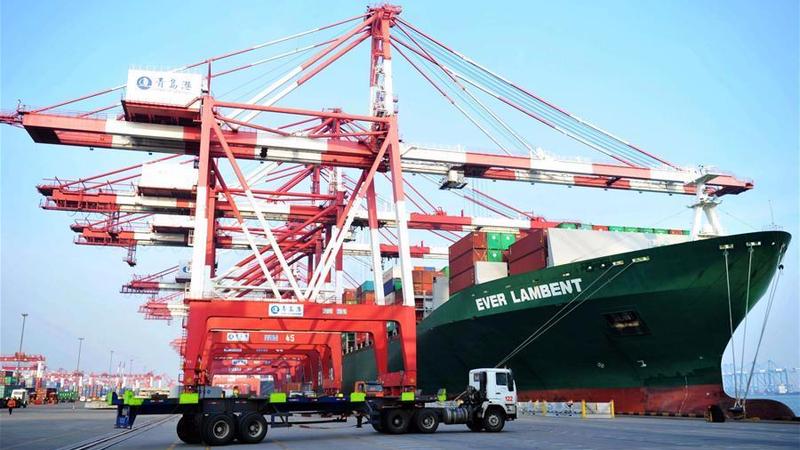Media Report

- The Wall Street Journal reports: "China likely will offer to import more U.S. goods during negotiations in Washington next week as the two sides see one of the best ways to avert an all-out trade war is for Beijing to buy American. Sufficient progress was made when a senior U.S. delegation went to Beijing last week, say the two sides, that China is dispatching its chief economic envoy, Liu He, to Washington in the days ahead, though China hasn't confirmed his arrival date. Mr. Liu is expected to come with a shopping list of sorts, specific ideas for purchases designed to narrow the two country's vast trade imbalance. Chinese officials expressed willingness to work with the U.S. to reduce the trade gap during last week's talks, but they didn't agree to the U.S. demand that China cut its trade advantage by $200 billion by the end of 2020. Last year the U.S. ran a $375 billion merchandise trade deficit with China and a $337 billion shortfall when counting services."
- CNBC reports: "North Korea's Air Koryo plans to launch charter flights between Pyongyang and Chengdu in south-west China, two airline officials told Reuters, amid a major improvement in diplomatic relations between the neighbours. The flights to Chengdu, one of the biggest cities in China's vast western region, could start as early as late June if approved by China's aviation regulator, the officials told Reuters on condition of anonymity. "At the moment this is still a plan. Whether it can actually take off will be impacted by the policy environment going forward," said one of the officials, who said an application to the regulator had not yet been submitted. "Now perhaps it's Chengdu, afterwards could be Dalian, Guangzhou. If there's a market we'll fly, if not we won't," he said, noting Chinese travel agencies were involved with marketing the flights to potential customers."
- Bloomberg comments: "The U.S. and China continue to head toward a possible trade war, as negotiations to bridge the gap between the two countries last week ended inconclusively. Donald Trump's administration has demanded far-reaching Chinese concessions to reduce the bilateral trade deficit, address Beijing's mercantilist trade practices, and open up key sectors of the Chinese economy to greater foreign competition. The White House has underscored its demands by applying sanctions on steel, aluminum and a host of other imports and restrictions on Chinese investment. Beijing has responded in kind, imposing tariffs on an array of American goods from frozen pork to aluminum scrap and offering only minimal concessions. The consequences of a full-on confrontation between the world's two largest national economies would be quite serious across the globe. But the Trump administration is not entirely wrong to be disrupting the U.S.-China trade relationship. Rather, the story here is a familiar one in the Trump era: The president is blending a halfway-sound insight on global affairs with deeply counterproductive execution."
Calendar
- 2018-05-09 China is the big wild card in Trump's Iran decision
- 2018-05-08 Kim’s Second Surprise Visit to China Heightens Diplomatic Drama
- 2018-05-07 China's trade imbalance with U.S. a long-term problem, says central bank governor
- 2018-05-06 Trump may have no Plan B on trade
- 2018-05-04 China denies pointing powerful lasers at U.S. aircraft
- 2018-05-03 Trump praises China's Xi as trade talks begin in Beijing
- 2018-05-02 Chinese state media has a message for the US ahead of trade talks in Beijing
- 2018-05-01 White House Considers Restricting Chinese Researchers Over Espionage Fears Image
- 2018-04-30 China Sends Foreign Minister to Pyongyang
- 2018-04-27 China is trying to lure Trump into a bad deal on trade
News
- The Wall Street Journal China Draws Up a Shopping List of American Goods to Avoid Trade War
- CNBC North Korea airline plans new China charter flights amid diplomatic thaw
- Bloomberg Time for Team China to Help Out ZTE
- The New York Times 10 Years After Tragic Quake, China Calls for 'Thanksgiving'
- CNBC The shocking Malaysian election result could hit Chinese investments
- The Wall Street Journal Why Ford's Big China Wager Is Faltering
- Bloomberg Iran's Door to the West Is Slamming Shut, and That Leaves China
- Financial Times US-China trade tensions increase after import delays
- The New York Times With Jail Sentences and Corporate Flameouts, China Is Tackling its Debt
- Business Insider Trump's trade fight with China just claimed its first big victim
- CNN ZTE is now center stage in the US-China trade fight
- CNBC Take a look around Huawei's headquarters in China
- The New York Times China Sentences Anbang Founder to 18 Years for Fraud
Commentary
- Bloomberg Trump Is Right on China But Wrong on Tariffs
- Foreign Policy China Has Already Won the Drone Wars
- Harvard Business Review 8 Ways Brands Can Fight Counterfeits in China
- CoinTelegraph China Will Issue Blockchain 'Standards' In 2019, Says Gov't Official
- The Wall Street Journal Why Ford's Big China Wager Is Faltering
- Forbes China Is Launching A Weather-Control Machine The Size Of Alaska
- Bloomberg China's Spies Elude U.S. Vacuum Cleaner
